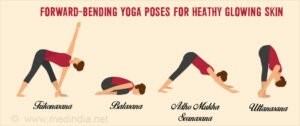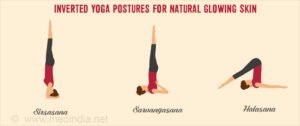Story by: Carla Sridevi Cohen
When I ask most people why they do yoga, I hear things like focus, de-toxing, pain relief, flexibility, strength, de-stressing or seeking internal peace. Today, I want to talk a little about the “detox” aspect of yoga.
Like any form of exercise that stimulates movement in the lymphatic system, yoga helps us push toxins through and out of the body. This is one of the many excellent benefits of yoga, but even though yoga is a form of purification, it does not and cannot completely undo the effects of the variety of toxins we are exposed to both voluntarily and involuntarily every day. Everything we do, see, feel, ingest, apply and experience impacts our physiology – including wolfing down junk food after class. The human body is already a walking chemical factory and when we add food or soap or hair dye, we alter our natural chemistry. The results can be life threatening, creating cancers, respiratory issues and other very serious health problems.

The skin is the largest organ we have. It is also quite permeable. This is also true of our nails and hair. Whatever goes onto the skin, nails and hair goes into the body and into the organs. Yes, even nail polish and hair dyes. Although yoga and cleansing is awesome for re-booting the body, it is not enough to remove the massive assault of chemicals we ingest, apply and inhale on a daily or weekly basis. Yoga is about mindfulness, but mindfulness extends beyond the body, beyond our emotions and certainly should cascade into the other aspects of our life. If we want to live a long and happy life, it’s imperative we become more mindful outside of our practice and decide to become more aware of the simpler things we do each day.
One of the biggest dangers for anyone, including yogis and other athletes is the residue from the detergents and fabric softeners on their clothes. Commercial soaps, fabric softeners and even some of the supposedly eco-friendly products we use contain “fragrance.” Even “fragrance-free” products, by law, can contain a percentage of “fragrance”. Fragrances are synthetically manufactured “chemical soups”. They are made in a lab. They are proprietary, meaning they don’t have to tell you what’s in them. Even many essential oils on the market contain phthalates. Before I was an aromatherapist, I used to love the “fresh” smell of commercial detergents on my clothes after they were washed and dried. Now, that smell makes me cringe. That “clean” smell is a sign of fragrance and it is anything but clean. Synthetically made or synthetically “enhanced” fragrances are all around us. Think of all the smells in your hair products, air fresheners, commercial hand soaps, make-up and the list goes on.
So, what’s so bad about “fragrance”? Any synthetic fragrance contains something called a Phthalate. The Environmental Protection Agency, EPA, put phthalates on a list of chemicals that “may present a risk” to the environment or human health. That’s because they disrupt hormone activity and some preliminary studies show that they may be causing a slow and steady demasculinizing of men. Some of the ingredients in fragrances can also be at odds with your Central Nervous System and cause things like anxiety or agitation.

When we perspire, which everyone does, or even get warm, the pores open and the skin absorbs in all those phthalates that are sitting on our clothes, sucking them into our organs and bloodstream, raising the risk of future health issues.
What can you do? If you have the time and the energy, you can make your own cleaning products. This will help reduce some of the toxic load. If you want to do that, you have to carefully scrutinize the individual ingredients in the recipe and hope that the companies are full disclosure companies. I personally am a huge fan of Thieves Laundry Soap and Household Cleaner. They come from a full disclosure company, contain no phthalates and can help support your immune system. Another thing you can do is take organic wool dryer balls or sturdy paper towels and put a few drops of Lavender oil on them to create your own “fabric softener”. Now….here is the thing, unless you can go to the farm where your lavender oil was grown, distilled and bottled, you don’t want to use just any lavender on your clothes as you will get synthetically “enhanced” lavender and be right back where you started. There is more lavender sold on the market than what is grown, so this is a big issue.
Life an Infused Life,






Recent Comments